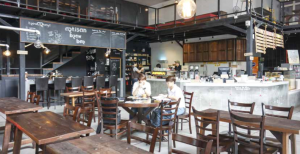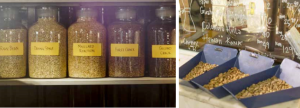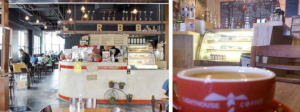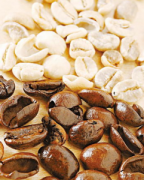General knowledge of Coffee Culture Fine Coffee Culture in Malaysia
Seoul, Singapore and Hong Kong have become coffee capitals in the region, and Malaysia seems ready to join the other three countries. We actually went to Malaysia to talk to local people about the current coffee trend. Recently, in Kuala Lumpur, Penang and the city of JohorBahru near Singapore, you can see many coffee lovers leading the improvement of coffee culture in these cities and opening up a more diverse coffee market. It is surprising that these changes do not come from big companies, but from many passionate boutique coffee industries.
Malaysia's new wave of boutique coffee is changing rapidly, and many new coffee lovers have opened their own coffee shops. JoeyMah and MichaelWilson are also two of the many newcomers.
"We were one of the few people who started using light-roasted coffee in the early days, and my first cup of Brazilian Camo (BrazilCarmodiMinas,CarmoEstate) was recommended by MichaelWilson. That cup of coffee completely changed my understanding of coffee and I began to recommend it to the people around me, and then we became the first independent roaster in Malaysia. It is difficult to change a person's requirements for coffee, but we insist on our requirements for coffee. Many people began to accept our ideas, but also because those people made us where we are today. People began to have their own taste in coffee, began to have more demands on baristas and bakers, and we began to improve ourselves in many aspects, including providing higher-grade coffee beans. As more and more people around us insist on the quality of coffee, we also begin to create a good market competition environment, which is good for providing consumers, and the quality of coffee is gradually improving. " Joey said so.

Michael continued, "I am very surprised by the rapid improvement of boutique coffee." I had expected steady growth, but I saw twice as many new coffee shops as I expected. " Michael predicts that the growth rate will increase again-as more and more sixth-generation coffee shops (SixthStagecoffeeshops) are set up, people will begin to feel that they have not had really good coffee and then want to see more good coffee shops. When we started, most of the customers were Malaysians who had lived in Melbourne, and they were used to drinking coffee this way. Now many Malaysians who have never been abroad are also beginning to enjoy the acidity of coffee and drink less bitter coffee. More and more people want to enjoy the original aroma of high-quality coffee and drink black coffee without sugar.
Customer service is another factor that pulls many customers away from the fourth-generation coffee chain (Forthstagecoffeeoutlets). Coffee quality is important, but service is the most important factor that makes customers feel different immediately. Michael has also noticed a sharp increase in the number of customers asking for hand-brewed coffee, perhaps because of advances in roasting technology.
To understand what fourth-and sixth-generation coffee shops are, please refer to the Revolutionary Evolution of six kinds of Coffee (Thesixdisruptiveinnovationsofcoffee). Cheryllee of Dankoff Coffee told us that "Fine Coffee entered Malaysia around 2010. The new coffee shops have a better drinking environment and more coffee choices, while some have set up their own baking services. "
When Malaysia began to have boutique coffee in the early days, most people were not so receptive to it, and many Malaysians could not understand the difference between ordinary black coffee and fine coffee. So in June 2010, Cheryl was the first to set up a coffee classroom and studio to teach you how to enjoy boutique coffee.

The scale of Malaysia's boutique coffee industry is the result of the joint efforts of many coffee shops. At the end of 2011, PlanB Roasters opened by Cheryl offered coffee of the World Coffee Competition grade, with a well-trained team. Since then, more new boutique coffee shops have joined the market to promote boutique coffee.
"the current market for boutique coffee is gradually growing, but it seems that there are too many newcomers to join and do not see enough customers."
People who like to drink horse-style black coffee also begin to like fine coffee, but we also know that black coffee is a unique coffee culture and tradition in Malaysia. We can't forget our roots, but we are also excited to embark on the road of boutique coffee. On the other hand, Malaysian coffee roasters also need more experience and exposure to improve their quality. They need this experience to meet the needs of the market.
Most customers are attracted by coffee flowers at first. Pull flowers used to be the main reason why people love coffee, but they are also gradually beginning to understand what is fine coffee. At present, more and more customers are beginning to ask for higher quality coffee. They know how to appreciate the aroma and production background of coffee, so if the baker doesn't do his homework, the customer will find out immediately.
Many customers now know how to appreciate the fruity aroma and taste of coffee itself. In addition to espresso, hand-brewed coffee is becoming more and more popular, and customers know how different brewing methods can give them different quality and taste of coffee. BoydYap of Dankoff Coffee told us about the changes he saw in the market after he sponsored the Malaysian coffee division competition. People began to know about the existence of these competitions and began to visit many different stores to see what the contestants brought back to China. "more and more new coffee shops have been set up, and many of them have a deep understanding of coffee, and some even have coffee licenses. This is also very good for Malaysian coffee, these people can help the growth of the domestic coffee industry and educate more consumers.
They go to a coffee study camp in Malaysia, such as BGA (BaristaGuildAsia Asian baristas Association), and they use the European syllabus. Some people actually go to coffee shops to hone more experience. Many of these people will start to travel around, find more inspiration and then return to Malaysia to open their own stores. "people who attend the study camp will start looking for locally famous roasters to bake their coffee because they are newcomers who are inexperienced. In addition, you can also add points to your brand through experienced bakers, which is a safer way to do so, "Boyd said.

JaniceSoh, from MyCoffeeTrais Coffee Shop, is also the second winner of the 2013 ASEAN Coffee Masters. She said, "Coffee is part of my life. Boutique coffee has continued to be popular since it began at the end of 2011, and more customers will start to taste it and try its differences. Conceptual coffee shops and mobile coffee makers are mostly enthusiastic young people who are willing to put boutique coffee into their own products. Many companies have also begun to set up coffee classrooms and study camps to help these coffee-loving entrepreneurs. "
In Malaysia, when it comes to the growth of the coffee industry, there are two cities that cannot be ignored, namely, Penang and Xinshan. Victorleong of lighthouse Coffee is a pioneer of the boutique coffee industry in Penang and the founder of BattleofBaristaChampion-ship. "before 2007, Malaysia's coffee industry was not international, not many people knew about boutique coffee and didn't care about coffee quality," he said. They use pasteurized milk and buy regular commercial coffee beans. That's why I opened the lighthouse Coffee Shop to educate customers and other coffee makers. "
CynthiaChia of Xinshan also said why she opened CarffeeCoffeeBar. "most of the coffee shops in Xinshan are chain coffee shops. They use beans from Liberia because most of them are grown in Malaysia, and Myliberica Cafe is very successful because they have their own coffee fields.
The coffee market in Xinshan is very small because there are not many non-local tourists, and it is not as attractive as a big city. Most customers prefer to watch the coffee flower rather than the taste of the drink. That's why we set up a training room to expand the local coffee market. We want to have many different courses, although some have gone beyond local trends. Many people come here to learn the skills of coffee flower drawing or to learn how to make espresso, but I hope they can start to learn how to taste coffee first. "promote the overall boutique coffee industry through customer education whenever you travel to Australia and Singapore. Chiang Mai, Thailand and other coffee-loving cities will ignite people's enthusiasm for coffee. Because of the high demand for coffee, the younger generation prefers follicular coffee followed by espresso.
About five years ago, you could only drink regular black coffee on the market, while coffee chains had filtered coffee or iced coffee. Today, there are many boutique coffee shops like Coffex Coffee Shop to help lead the market. Coffex has a baking plant equipped with the latest technology and traditional roasters, and many operators, such as ArtisanRoasters,lightHouse Coffee Shop, have joined Coffex. These coffee producers are certified by the Asian baristas Association and Illy Coffee University.
Danielliew of the Asian baristas Association shares his coffee education program. "We want students to know more about the coffee roasting process, the planting process and the whole coffee business process. Not only to learn how to make beautiful coffee flowers, but to understand the value of the coffee industry as a whole. " "after participating in the courses of American Fine Coffee and ASEAN Fine Coffee Association, I found that the contents of the two courses were very different. I combined the focus of the two courses and taught the new baristas how to be a successful barista. " Then I founded the Asian baristas Association and successfully introduced it to most baristas in Kuala Lumpur. The Asian baristas Association is a neutral group. We do not do any sales and only provide learning courses. Most of the courses and tests are based on the content of the ASEAN Fine Coffee Association, but there are also some contents of the American Fine Coffee Association.
With the development of the industry, we have also set up grinding and coffee repair courses to teach baristas how to maintain different kinds of grinders and how to maintain their own coffee machines. We have also held a number of coffee competitions, such as the 2013 Malaysian Coffee Masters. The market began to notice our guild, and many champions joined our training.
We have a training lab and a mock coffee shop where students can do exercises. The purpose of these courses is to teach how to operate, with two days of training and five days of practice. Students can come back to practice at any time and then take the exam the next day. " Daniel also said that the most important thing to say to students who want to participate in training is enthusiasm and attitude. Skills can be trained, but we can't train students with bad attitudes.
The future of Malaysian boutique coffee Kuala Lumpur's Publika district is now the most popular coffee area, with many offices, businesses and homes. Many well-known coffee shops are also stationed here, providing delicious coffee and creating many landscapes that combine with the streets. Many stores have unique interior decoration styles like Melbourne and New York, and many stores have champion baristas. The store offers a variety of coffee product options, and any coffee enthusiast who comes here can get great satisfaction. It is an area that coffee lovers must visit when they come to Kuala Lumpur.
Janice saw this and said, "Malaysia, like many Asian countries, has its own traditional way of drinking coffee, which makes it more difficult for us to promote boutique coffee in the first place." But after combining the joint efforts of many people, more and more people agree with boutique coffee. The more people know about coffee, the better we have to do, which is a good sign for baristas. " Michael also believes that the future development will be very interesting. "We are on our way to a new coffee path and have more opportunities to get in touch with producers. And because there is more investment in equipment, there is an opportunity to make more progress in quality control. We are still trying to find the best coffee. "there is no denying that the world is getting smaller and smaller because of the Internet.
"with the help of the Internet, independent coffee makers can grow rapidly," victor said. Most coffee makers in Kuala Lumpur and Penang are very young, mostly in their 20s and under 30s. They can do a lot of things in the coffee shop, such as making their own chairs. Penang is a tourist area, and if the government can help promote tourism, perhaps more and more coffee shops will be set up one after another, which is good for the coffee industry. " "the current problem is that there are not enough baristas and we need to train more baristas. Or let young people who have just graduated from food or restaurant departments have the opportunity to enter the coffee industry, so that they can understand that baristas are not just making coffee, but a professional job that requires comprehensive skills. "
There are many coffee shops that want to try some interesting new tricks, but due to the law, it is difficult for Malaysia to import high-quality coffee raw beans. There is no tariff on imported coffee, but the law reduces the import to only one container per month. This situation makes it impossible for many small bakeries to bake, so they need to import raw beans with large operators such as ArtisanRoasters.
If we continue to study the issue of coffee education, we will find that it is actually going on anytime and anywhere in the urban area. Communication with customers can be seen not only in the classroom, but also in some coffee shops. Customer education is very important in the lighthouse coffee shop and they are also the organizers of the barista contest, one of the two major coffee competitions in Malaysia. The other competition is not WCE certified, but the barista competition has WCE certified judges to assist in the competition. Both competitions have been going on for five years, and there may be new competitions to stimulate the coffee industry in the future. An Asian Coffee and Art Exhibition (CoffeeandArtFringeFestivalAsia-CAFFA) will be held at the end of this year, which will combine public art and music coffee from all over the world to lay a better foundation for Malaysian coffee culture.
Important Notice :
前街咖啡 FrontStreet Coffee has moved to new addredd:
FrontStreet Coffee Address: 315,Donghua East Road,GuangZhou
Tel:020 38364473
- Prev

Coffee beans common sense coffee roasting defective beans introduction
Mildewed beans: because the drying is not complete, or in the transportation, storage process damp, and grow cyan, white mold, sometimes make beans stick together, if not remove these moldy beans, will produce mildew smell. Dead beans: beans that bear abnormal fruit. The color is not easily changed by baking, so it is easy to distinguish. The flavor is thin and harmful as silver skin, which will become peculiar smell.
- Next

Introduction to the operation method of using basic siphon pot for coffee utensils
I think my friends who read this post should know how to make a siphon pot of coffee. today, a friend suddenly asked why the siphon pot can only stir 3 times and stir 3-5 times at a time. With this question in mind, today we talk again about the siphon pot, that is, the effect of the number of times of stirring on the taste of the coffee in the process of making coffee. I've said it many times before.
Related
- Beginners will see the "Coffee pull flower" guide!
- What is the difference between ice blog purified milk and ordinary milk coffee?
- Why is the Philippines the largest producer of crops in Liberia?
- For coffee extraction, should the fine powder be retained?
- How does extracted espresso fill pressed powder? How much strength does it take to press the powder?
- How to make jasmine cold extract coffee? Is the jasmine + latte good?
- Will this little toy really make the coffee taste better? How does Lily Drip affect coffee extraction?
- Will the action of slapping the filter cup also affect coffee extraction?
- What's the difference between powder-to-water ratio and powder-to-liquid ratio?
- What is the Ethiopian local species? What does it have to do with Heirloom native species?

